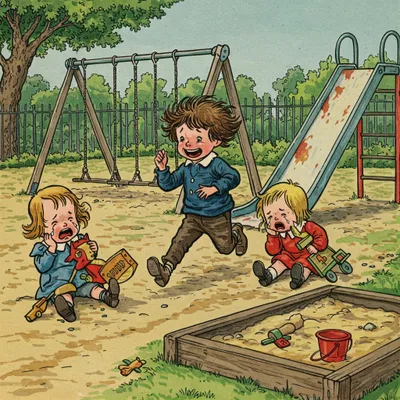Georgie Porgie

Lyrics
Kissed the girls and made them cry,
When the boys came out to play,
Georgie Porgie ran away.
History and Meaning
The nursery rhyme "Georgie Porgie" emerged in written collections around the mid-19th century in England, with one of its earliest known appearances being in James Orchard Halliwell-Phillipps's The Nursery Rhymes of England. Like many traditional rhymes, it likely existed in oral tradition for some time before being documented. The simple verse describes a boy named Georgie Porgie who engages in unwanted affection ("Kissed the girls and made them cry") and displays cowardice when faced with confrontation ("When the boys came out to play, Georgie Porgie ran away").
Despite its seemingly simple narrative, "Georgie Porgie" has often been the subject of speculation regarding hidden historical meanings or allegorical references, though none are definitively proven. One popular theory links the rhyme to George Villiers, the 1st Duke of Buckingham (1592–1628), a handsome courtier favoured by King James I and King Charles I. Villiers was known for his numerous affairs (potentially "kissing the girls") and political maneuvering, which caused distress (making people "cry"), and faced accusations of cowardice or fleeing from difficult situations ("ran away"). His unpopularity could easily have inspired satirical verses.
Other interpretations suggest later figures, such as Prince George, the Prince Regent (later King George IV, 1762–1830), known for his portly figure ("pudding and pie"?), womanising, and unpopularity, especially regarding his treatment of his wife. Some even point further back to King George I or II, both of whom had reputations involving mistresses and court scandals.